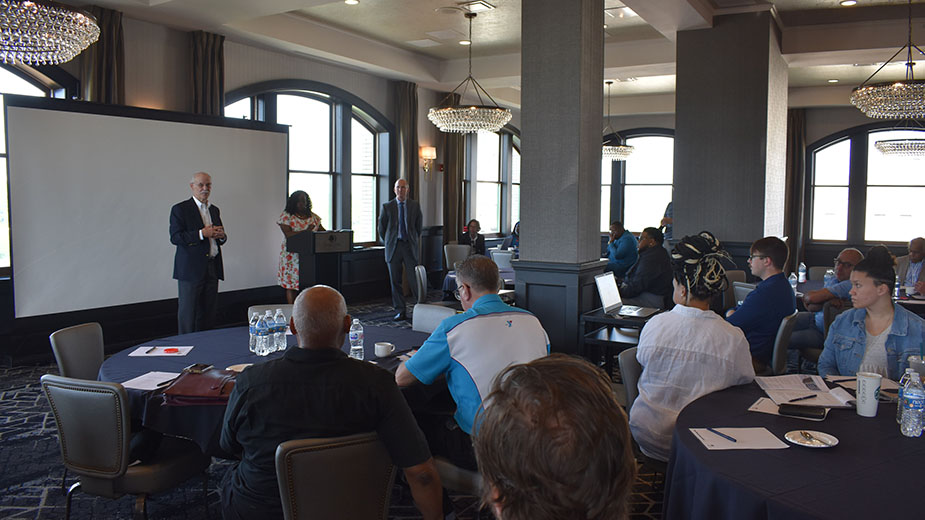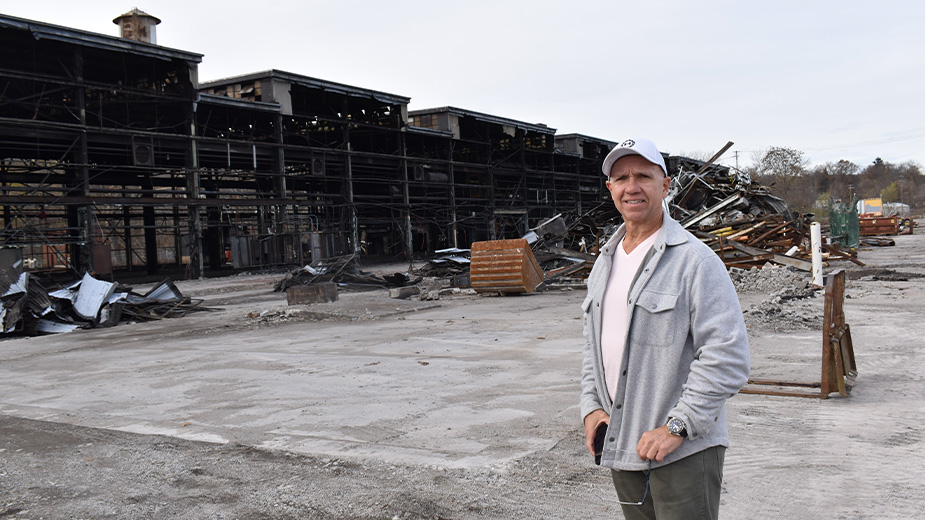Business Owners Tell City How to Spend $82.7M
YOUNGSTOWN, Ohio – Using federal stimulus funds to improve Youngstown’s main corridors and entryways, assist city businesses and reduce the city income tax rate to encourage businesses to come here were among the suggestions offered Friday during a forum with business leaders.
The business community was invited to the city-hosted American Rescue Plan Summit to discuss how to best use the $82.7 million in federal funds it will receive.
More than a dozen business leaders attended the summit in person at the DoubleTree by Hilton Youngstown Downtown, with another eight participating virtually.
It was the first of three sessions targeted to specific constituencies that the city hosted Friday. They followed three sessions Thursday, the same day that the city received the first of two installments of the federal funds.
“We take this opportunity very seriously. We want to make sure we’re planning with the community, not for the community,” said Nikki Posterli, director of community planning and economic development.
Kyle Miasek, city finance director, described the federal funds as “the largest positive jolt” to the city’s budget in decades.
“We need to make sure all of us have a stake in how we use these funds,” he said.
The challenge that the city faces over the summer as it seeks input on how to use the funds is addressing its current needs as it identifies the “shared aspirations” of the community, said Hunter Morrison, an urban planning consultant contracted by the city.
“How can we invest today to build the foundation for the future?” he asked.
Charlie Staples, owner of Charlie Staples Famous Bar-B-Que, called on the city to direct funds to improve and beautify Belmont Avenue and to replace the 18-inch sewer line installed when it was primarily a residential area. Belmont, one of the city’s main thoroughfares, runs past his namesake restaurant at 327 W. Rayen Ave.
“That ought to be the entrance to the medical center, the university, downtown. Right now it doesn’t look the part,” Morrison replied. Belmont Avenue also has the largest concentration of locally owned restaurants in the region, representing a wide range of ethnicities.
Individuals like Staples who own property on the main corridors and gateways “need to engage with us on what ought to happen,” Morrison said. “One of our key focal points will be that, but we need your input in making that happen.”
Sami Rafidi, owner of Sami Quick Stop, said he’s interested in working with the city on enhancing the gateway into the city from Boardman at the Midlothian Boulevard intersection with Market Street, where he has a convenience store, to make it more inviting.
“I would welcome the opportunity to present a plan for both corners,” he said.
Rafidi said he is interested in developing a plaza on one of his parcels at the intersection similar to the one he developed in 1988 at South Avenue and U.S. Route 224 in Boardman.
The city is working with Western Reserve Transit Authority on a plan to focus transit services on key corridors in a way that stimulates development, Morrison said.
“Market and Midlothian is perhaps the best corridor in the region for this type of development,” he said.
“This is a gift we need to make sure keeps on giving,” developer Dominic Marcionda said of the federal funds. “What can we do to incentivize people to come back downtown?”
The owner of NYO Property Group, which developed the DoubleTree, said he sees the city’s 2.75% income tax as contributing to downtown job losses.
“We need to bring businesses downtown,” said Brian Angelilli, president and CEO of GreenHeart Companies, Boardman, following the meeting. GreenHeart is renovating the former Legal Arts Centre building downtown and plans to begin work this summer on redeveloping the Gallagher Building.
Angelilli suggested implementing incentives such as “an income tax abatement or something” to lure business back. “We cannot fill up all these buildings with apartments,” he said.
Youngstown Flea founder Derrick McDowell raised concerns over potentially emphasizing downtown and the corridors over the city’s neighborhoods.
“I’m a property owner downtown as well. I love our downtown,” he said. “It looks like 50% of our funds have gone to projects downtown. Where is the equity toward communities?”
Focusing on the downtown central business district is important because of the concentration of employment. “That’s where the jobs are in the city,” Morrison replied.
The corridors are the neighborhood commercial districts and City Council has emphasized their importance, he continued. The neighborhoods that adjoin those corridors will be a focus of funds as well, according to Morrison.
Sheri Bodo, who launched Common Good Studio store at 2000 Canfield Road earlier this year, said she would like to collaborate with the city to revitalize a downtown building and bring her retail concept there.
Aspasia Lyras-Bernacki, co-owner of Penguin City Brewing Co., said she wants the city’s support as her company grows with job creation. Penguin City is redeveloping a warehouse near McDowell’s building to use as the company’s headquarters, a restaurant and an event center.
“We’re on the verge of statewide distribution,” she said. “That means we’re going to be growing more. We’re going to be looking for a distribution center.” I’m not asking for money but I’m asking to have the city next to me when we grow.”
Lyras-Bernacki she wants to work with McDowell on beautifying the corridor where their buildings sit.
During the feedback sessions, participants have identified include workforce development, housing, youth engagement and broadband as potential uses of the funds, Posterli said.
“The response has been really positive,” she said.
In addition to collecting information via an online survey, the city will conduct listening tours this summer to get input from residents and stakeholders.
The goal is to have a plan in place for using the funds by the end of the year. But, Morrison cautioned, “The plan is done when the plan is done.”
Pictured at top: City officials address business leaders Friday at one of several sessions to discuss how to spend $82.7 million appropriated by the American Rescue Plan.
Copyright 2024 The Business Journal, Youngstown, Ohio.



